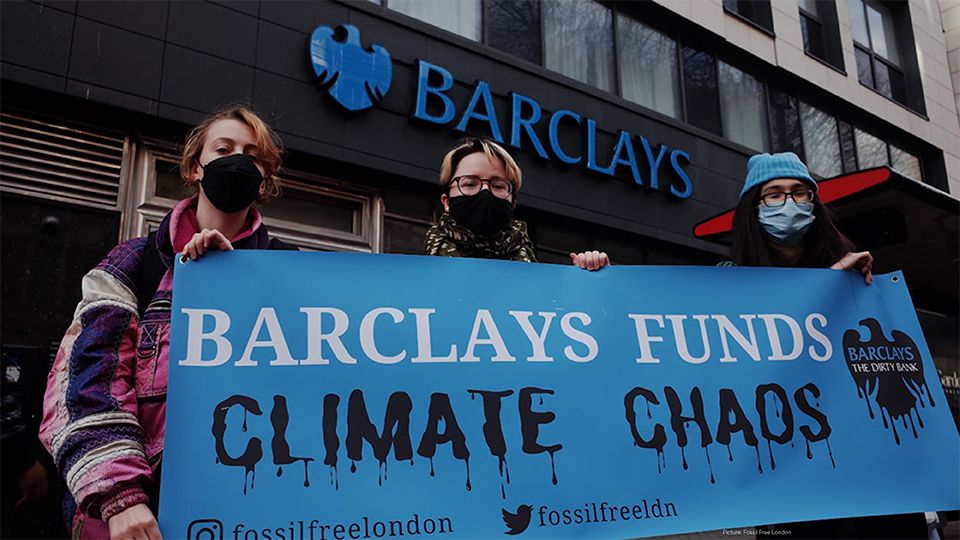The International Energy Agency’s (IEA) analysis that a pathway to net zero will require no new oil and gas projects is “a bit more complicated than that”, Barclays group chair Nigel Higgins said yesterday at an AGM dominated by climate concerns.
Held in London yesterday, the bank’s AGM faced some 15 questions from ordinary and proxy shareholders alike over its climate strategy, which does not completely restrict the financing of new oil and gas projects. According to ShareAction, Barclays is the second biggest European provider of financing to oil and gas companies with expansion plans.
“The world at the moment cannot function without fossil fuels and our plan is not at the moment to exit that sector,” Higgins said, pointing out that it was perhaps not surprising a large investment bank such as Barclays would remain more invested in energy than its high street competitors.
In response to a question from BankTrack on how the IEA’s 2021 analysis on net-zero pathways relates to Barclays’ strategy, Higgins said: “The IEA says the world doesn’t need more oil and gas… it’s a bit more complicated than that…I think the report was written before the Ukraine war, which will have complicated things…We understand the IEA report but it’s a bit more nuanced than that.”
Updated climate strategy
Higgins outlined the bank’s climate strategy, which was updated in February this year, and includes a tighter thermal coal policy in line with other banks, an exit of the oil sands sector, targets for five out of 10 of the NZBA sectors, new heads of sustainability, work with the UK’s Transition Plan Taskforce and advanced climate disclosures. The bank is also targeting £1trn new finance on renewables between 2023 and 2030, and has tightened its deforestation policy.
Higgins also told shareholders that bank has cut its 2016-2021 emissions by 32% and is accelerating its transition process for clients, with 150 having gone through the process already and 750 expected to in the next 12 months.
Shareholders voted to approve all of Barclays’ resolutions. However, many attendees remained unsatisfied, with one protestor interrupting Higgins’ climate strategy outline saying “bulls**t, they are the largest financier of oil and gas”.
Protests
The AGM, which was delayed half an hour by a 70-strong Climate Choir singing “stop right now, no more oil and gas” to the tune of Spice Girls’ ‘Stop’, saw several protests, including a Shakespearean condemnation of Barclays as being on the wrong side of history by Fossil Free London.
Protestors cried “don’t shuffle us off this mortal coil” to which Higgins replied “we’d like to shuffle you off”.
Jeanne Martin, head of banking programme at ShareAction, who read out a statement on behalf of investors including Brunel Pension Partnership, Candriam, and Northern LGPS urging Barclays to introduce restrictions for companies it finances that are themselves expanding oil and gas extraction, said: “Despite taking some important steps forward in the past year, such as cutting oil sands financing, Barclays has failed to fully match its oil and gas policy to its own net-zero goal.
“As a major international bank, Barclays’ financing decisions will have a significant impact on the world’s chances for reaching net zero by 2050 and averting the worst effects of the climate crisis, such as extreme weather events and flooding.
“Yet, the bank is now falling behind minimum levels of ambition for climate in the industry. Barclays needs to act now and address the concerns of its shareholders and stop directly funding new oil and gas fields, and take action against the companies behind these new fields.”
Further questions
Higgins and the board also received other questions from shareholders, including on human rights, the closure of high street branches, exposure to US banks, the merits of share buy-backs as compared with dividends and the bank’s share price.
ShareAction posed three further questions to the bank, on committing to an audit to prevent misalignment on climate and biodiversity, fracking, and ethnicity pay gap reporting, all of which Higgins said he was happy to pick up with the NGO.
The board also received a question from a shareholder online implying the bank was overly concerned with “identity politics” to its detriment, to which Higgins reinstated the bank’s commitment to diversity and inclusion and dispelled the myth that merit-based hiring is at odds with diversity and inclusion.
Look out for ESG Clarity’s roundup of bank AGMs later this month.








